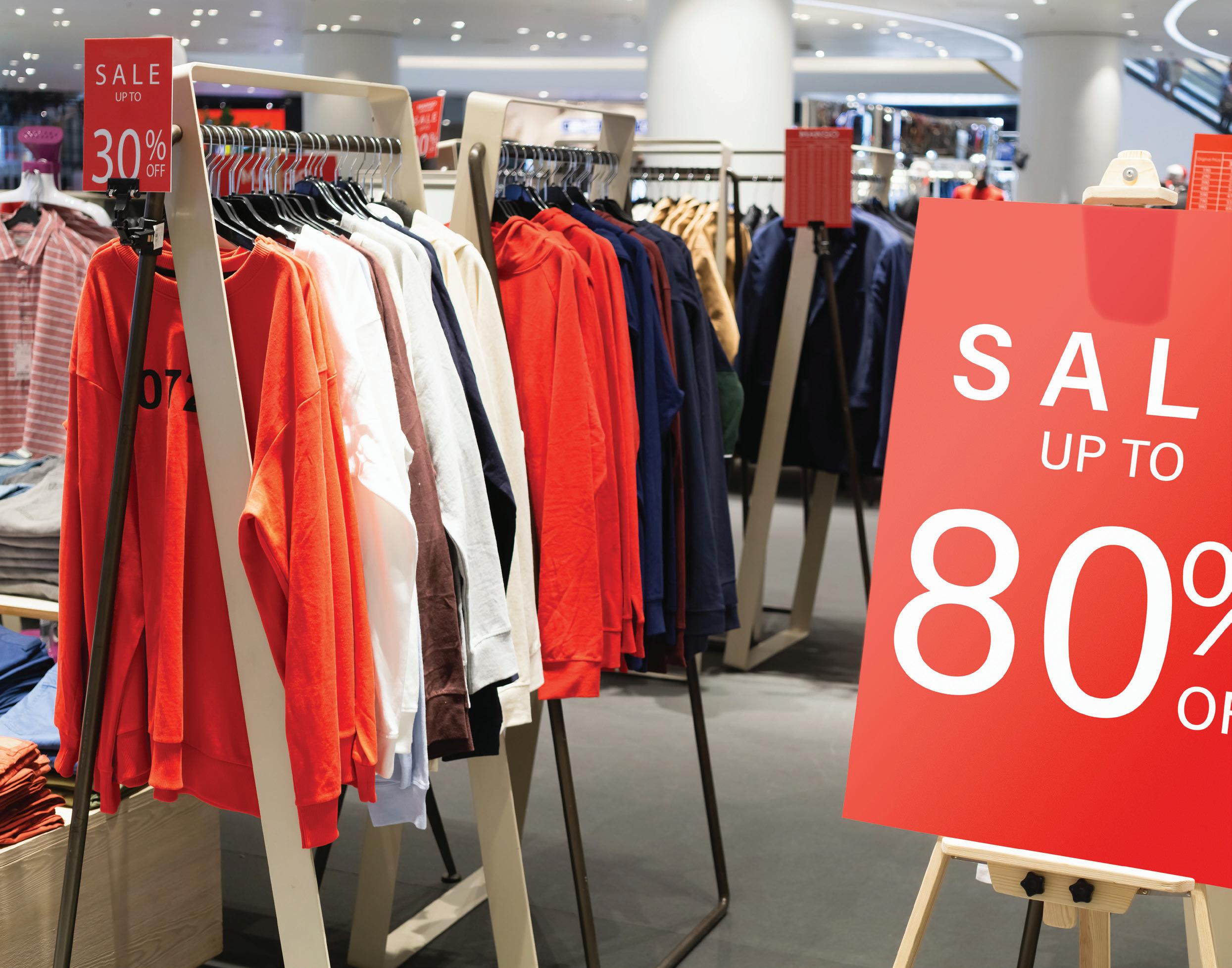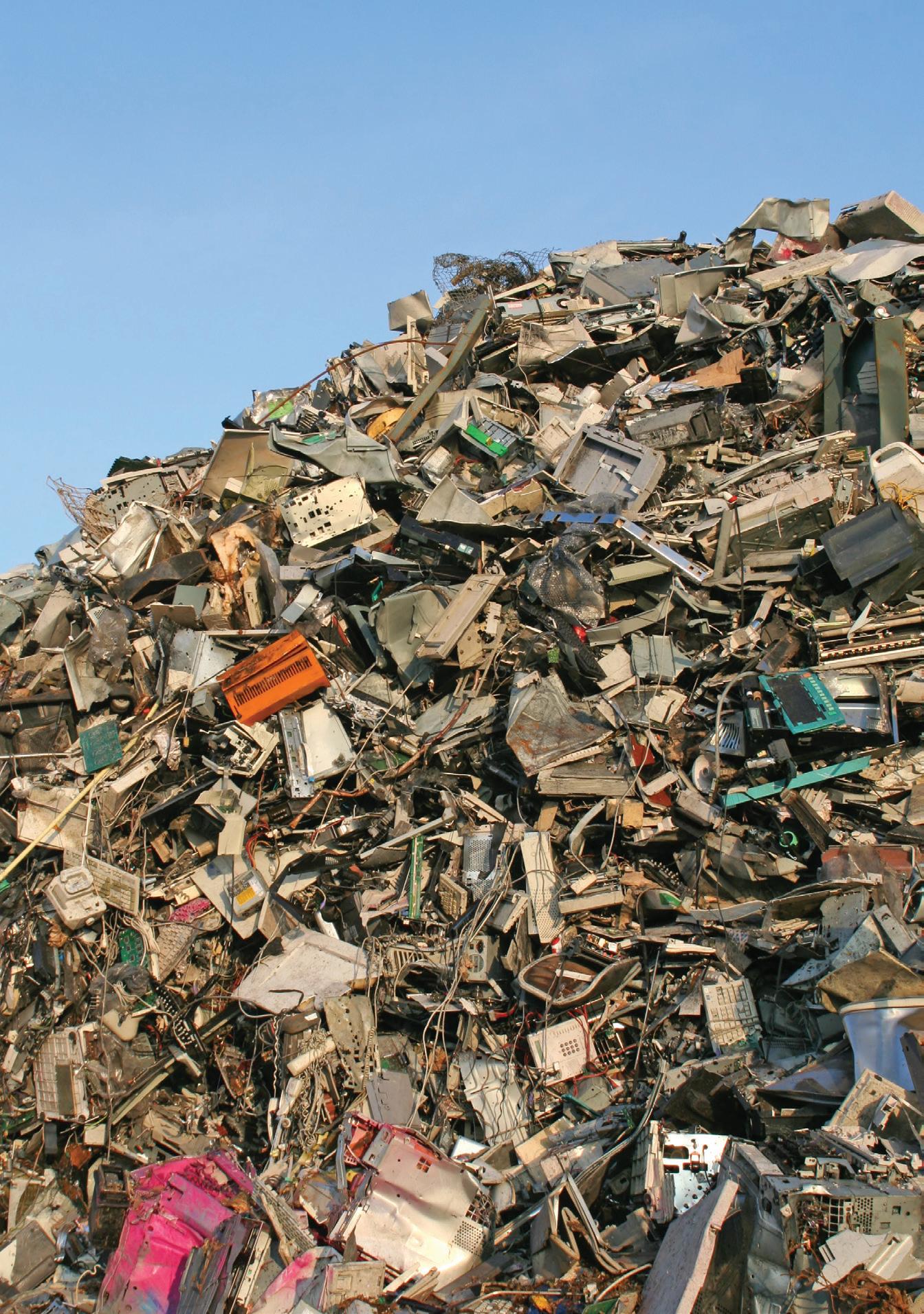
9 minute read
What’s shopping got to do with church?
Deborah Sloan looks at the effects of consumerism on our society and on our faith.
“What’s that got to do with church?” asked my daughter when I said I was writing an article about shopping for the Presbyterian Herald. “Everything,” I replied.
Christmas 2024. It seems like a distant memory now. Those electric vans have stopped arriving at my gate and leaving brown packages on a daily basis. The last tub of Celebrations has been finished and recycled. The overflowing wheelie bins have returned to some degree of normality. My garage has been decluttered of the random bits and pieces for the charity shop. I am enjoying listening to music through my new wireless earbuds. I am no longer frustrated by the old ones which required a recharge after less than 40 minutes. The batteries couldn’t be replaced and so, I had no choice other than throw them away. But where exactly is this magical place called ‘away’? Well, according to the recent Netflix documentary Buy Now! The Shopping Conspiracy, ‘away’ means I’ve made it someone else’s problem. Away is out of sight and out of mind. As we head towards Easter, and the shops fill up with merchandise I might want to purchase to mark the next significant event in the Christian calendar, I am certainly not thinking about where my festive rubbish has ended up. But perhaps, I should be.
…we’re all being… manipulated into desiring material possessions we believe will make our lives better…
I rarely go on a ‘shopping spree’. I don’t visit a high street very often. I donate anything unwanted. I have lots of positive feedback on eBay. I separate my cardboard from my potato peelings. I regularly re-heel my footwear. I could probably choose to feel somewhat good about my habits. But unfortunately, I, like most people, am still living on what is known as the ‘treadmill of consumerism’. In the 21st century where social media fuels a culture of continual comparison, we’re all being encouraged to buy more, manipulated into desiring material possessions we believe will make our lives better. I, like many others, buy far more than I need.
“There’s a science to get you to buy stuff,” explains the Netflix documentary. No one needs a new hoodie or a new T-shirt or a new pair of shoes. Instead, what we need is a compelling reason to buy something and this is usually provided to us via powerful storytelling, celebrity endorsement or clever advertising. Once we are ready to buy, we must then be able to acquire it as quickly as possible. “We want to be there when you have your next shoppable moment” is a phrase used by a well-known online retailer who pioneered the concept of one-click buying.
In a world where sales and profit maximisation matter, we are all, it seems, being 100% played. Every trick in the book is being used to persuade us to accumulate more and more stuff. This includes:
Making it too easy for us. Getting into a car, driving to a shop, browsing the shelves, locating an item, and bringing it home is a lot of work. But if all we have to do is click a button and it arrives the next day, of course, we’re going to keep doing this.
Offering us incentives. Free shipping, buy-one-get-one-free, discount codes and ‘you might also like’ are all popular tactics.
Trapping us into replacement cycles. If a business relies on selling smartphones and most consumers already own one, then the continued success of that business depends on those consumers needing to replace their smartphones. This is achieved through what is known as ‘planned obsolescence’. Eventually the battery life of a phone will decline, or it can no longer be supported by the latest software. It will need to be upgraded.
Making it difficult for us to repair broken goods. Some of the most high-profile technology companies deliberately conceal information about how to fix their devices. They also make it virtually impossible to access internal workings through use of tamperproof covers, non-standard screws and unnecessary gluing or soldering.
Capitalising on our insecurities. Releasing a constant stream of the latest models tempts customers into discarding less up-to-date ones so they aren’t seen as out-of-touch or unfashionable. Terms such as ‘evolving’ or ‘taking it to the next level’ are regularly used to entice users to update to the latest iteration.
Alleviating our fears about the environment. Many companies put a range of symbols on packaging to reassure buyers about recyclability. But these can often be meaningless. Despite what the labels say, most of the 12 tonnes of plastic produced every second is not recyclable. It is more likely to be buried or burnt.
…most dangerous of all is how willing we are to allow corporations to absolve us of any guilt about our overconsumption.
Pacifying us via greenwashing. Businesses can pretend to care about sustainability because it is cheaper than tackling the actual issues. Greenwashing can be as subtle as using natural environments in adverts, getting children to deliver promotional messages and even extensive use of the colour green.
Reminding us that shopping leads to prosperity. Regularly, in our news bulletins, we will hear that a drop in sales is threatening our economy.
But perhaps most dangerous of all is how willing we are to allow corporations to absolve us of any guilt about our overconsumption. We are reluctant to question what they tell us about their environmental practices because believing them is preferable to confronting our own behaviours. And basically, all these ‘tricks’ are working. We are shopping until we drop. For example, 100 billion garments are being produced every year to meet the demands of the fast-fashion industry.
There’s a side to all of this which most of us would prefer not to think too much about and that’s what happens to the things we don’t want anymore. When designers and engineers develop a product, how it will be disposed of never enters the conversation. Once companies manufacture a product and pass it to retailers, its lifespan is no longer their responsibility.
…nothing will really change unless we review our consumerist attitudes and behaviours…
“We can’t recycle our way out of all this stuff they want us to buy,” the documentary tells us, and global waste is now increasing at an exponential rate, not only in volume but also in toxicity and persistency. End-of-life items are going deeper down the waste chain to whichever region of the world can get rid of them in the most cost-effective way, and that’s usually in ways that just aren’t safe. Weaker economies are exploited into creating illegal waste management systems which would cost much more to implement properly elsewhere. “They’re making someone else pay but they’re not paying with money, they’re paying with their health,” the documentary explains. We see footage of workers in Thailand, wearing minimal protective gear as they smash electronic devices filled with hazardous materials. We see mountains of clothes exported to Ghana, dumped at sea and washed up on beaches.

But as my daughter quite rightly asked, what does all this have to do with church? Well, the Bible tells us to:
Be good stewards of the earth. Remember those wireless earbuds. Well, these along with the 13 million phones thrown away every single day are generating mounds of electronic waste which is ending up in landfill. Harmful substances leaking out of e-waste are causing soil and water contamination, damaging wildlife and depleting natural resources. In addition, landfill emissions are contributing to climate change and irreversible environmental harm. Consumerism is destroying our planet.
Care for the vulnerable. Those most affected by consumerism are the poorest and weakest in our world. And this isn’t just in faraway places. It can also be much closer to home. It is often cheaper to dump unsold merchandise rather than redistribute it. “We don’t want to be the brand that homeless people use,” a former sales assistant reveals about one beauty company. She left after being told to squeeze any contents out of tubes before throwing them into on-street bins.
Advocate for justice. Rather than accepting economic and social injustice as a necessary evil to ensure the problem of waste doesn’t sit on our doorstep, we should be standing up against exploitative systems which perpetuate inequality.
Share where real hope can be found. “Whoever dies with the most stuff doesn’t win,” says one activist. Instead of craving worldly goods, we need to show an alternative way of living, pointing to where true fulfilment can be found in knowing Christ.
Consumerism is a complex moral and ethical challenge which demands urgent action. We can easily make small changes such as hanging on to electronics for longer and fixing them if possible, opting for paper rather than plastic, and saying no to throwaway fashion, single-use water bottles and disposable coffee cups. But taking action beyond this may cause us discomfort. What we should be doing is lobbying corporations around how they plan for the end-of-life of products and campaigning for policies and practices which ensure workers are fairly treated. But how many of us are willing to do this?
In fact, nothing will really change unless we review our consumerist attitudes and behaviours and decide this is no longer how we want to live and it’s not how we want our global brothers and sisters to live either, suffering while we sit back and enjoy our purchases.
One of the first things we could do is make more informed decisions about what we actually need. The documentary concludes with this simple advice:
“If you think you need something, put it in your online cart and leave it there for a month. If you still want it after a month, it might actually be something you need.”


